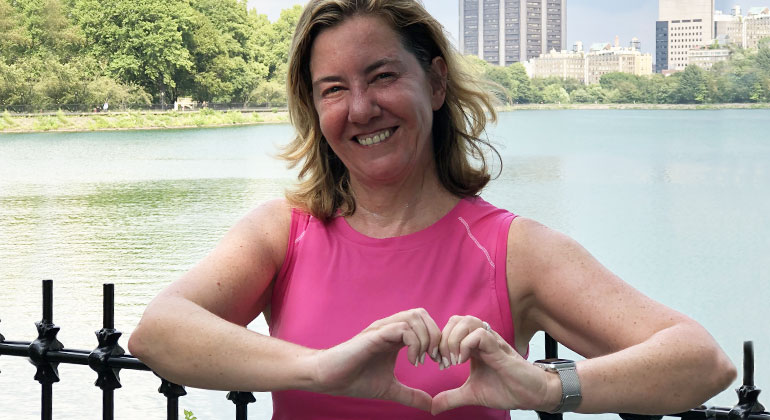
How a Busy New York Attorney Recovered From Heart Failure, Teaming With Mount Sinai Heart
In August 2019, Holly Weiss, a busy 53-year-old New York attorney, had just returned from a day of business travel when she started to feel shortness of breath and a worrying increase in her heart rate. A reading on her smartwatch confirmed something was wrong—her resting heart rate was 140 beats per minute, about twice as fast as it should be.
She went to The Mount Sinai Hospital’s emergency room, where an echocardiogram showed that her ejection fraction—which measures the efficiency of the heart was only 21 percent. “I was diagnosed with advanced heart failure,” Holly says. “If you Google heart failure, you're going to see a 50 percent survival rate in one year. That's not great.”
This stressful day (which she realized later had probably been going on for weeks to months) led to big changes in Holly’s lifestyle, with compassionate and comprehensive care at Mount Sinai Heart.
Heart failure is a condition where heart is no longer able to pump oxygen-rich blood to the rest of the body efficiently and can cause symptoms throughout the body. Holly realized she had actually been experiencing warning signs over the past few years, but she had ignored them.
“I was retaining fluids, she told TODAY. “So my shoes started to not fit anymore; rings on my fingers I managed to get off I couldn’t put back on; my belly was swollen. I had shortness of breath with any kind of exertion but also sometimes even when just standing up to speak. I basically stopped exercising because that was too hard. I started having a lot of trouble with the normal things like going up the steps. I started avoiding the subway.”
Anu Lala, MD, Associate Professor of Medicine (Cardiology), and Population Health Science and Policy at the Icahn School of Medicine at Mount Sinai, is an expert in heart failure treatment and was a lead member of the team that treated Holly.
“What was immediately evident to me was how important it was to establish a connection with her,” Dr. Lala says. “She made very clear to us that the word ‘heart failure’ frightened and demoralized her. So we said, Okay, consider us your heart function improvement team’.
In collaboration with Holly, the team put together a comprehensive plan that helped her monitor her own symptoms and her tolerance of the medications prescribed, and to make important lifestyle changes. She changed her diet, started to exercise regularly again, and learned to manage her stress levels.
“We were able to build upon it slowly, but surely,” Dr. Lala says, “and over time, she ended up on the maximal doses of all of the medical therapies that we know really improve the morbidity and mortality associated with heart failure. She is the perfect example of a patient who felt empowered to participate in the care journey along with her clinicians.”
After two years under the care of the team at Mount Sinai Heart, Holly’s heart muscle function has returned to normal.
She has retired from her stressful job as an attorney and now mediates and arbitrates cases assigned by the federal courts. She also runs a nonprofit dedicated to helping young girls in underserved communities find their voice through comedy. “We don’t want to make comedians, we want to make strong, confident women.”
Holly hopes her story will encourage others to prioritize their health and to seek help even if the symptoms seem mild. “Prioritize your health,” Holly says. “You only have one heart. You only have one body.”